- Home
- Fannie Flagg
Welcome to the World, Baby Girl! Page 2
Welcome to the World, Baby Girl! Read online
Page 2
In 1948 Neighbor Dorothy was a plump, sweet-faced woman with the big, wide-open face of a young girl. Although in her fifties she still looked pretty much the same as she did in the first grade when her husband, Doc Smith, the pharmacist down at the Rexall, first met her. After high school Dorothy graduated from the Fannie Merit School of Home Economics in Boston and came home and married Doc and taught school for a while until she had her first child, Anna Lee. Anna Lee had a few health problems, nothing serious, just a little asthma, but enough so that Neighbor Dorothy thought it was best to stay home with her and Doc agreed. While she was home all day she wanted to keep busy so she began baking cakes—and more cakes. Tea cakes, lemon, banana, caramel, cherry, chocolate, maple, and jelly roll cakes. You name it, she baked it. But her specialty was theme cakes. You’d give her a theme and she’d make you the cake to go with the occasion. Not that she couldn’t make a mean noodle ring or anything else you wanted but she was known for her cakes. There was not a child in Elmwood Springs or thereabouts who had not had a pink and white circus cake with the miniature toy carousel on top for her birthday party. Which is how she came to be at the Mayfair Auditorium over in Poplar Bluff on Home Demonstration Day giving out the recipe for her circus cake on the radio. She just happened to mention that she used Golden Flake Flour for all her cakes and the next day, when Golden Flake Flour sales doubled in four states, she was offered a show of her own. She told the Golden Flake Flour people thank you, but she could not leave home every day to drive the twenty-something miles to the station in Poplar Bluff and back, which is how the radio tower came to be put up in her backyard in the first place and how her youngest child, Bobby, happened to grow up on the radio. He was only two years old when Neighbor Dorothy first went on the air, but that was over ten years ago and he does not remember a time when there wasn’t a radio show in the living room.
When she first asked Doc what he thought about the idea, he laughed and said, “Well, you might just as well talk on the radio, you talk on the phone all day anyhow.” Which was not quite true, but true enough. Dorothy did love to chat.
Although radio station WDOT is only a 200-watt station, because the land is flat, on cold, still days when the skies are crystal clear, and it is really good radio weather, the signal from WDOT can tear a hole straight through the midwest all the way up into Canada and on one particularly cold day was picked up by several ships at sea. You can’t say her show is clever or sophisticated or anything like that, but one thing you can say for sure is that over the years she’s sold a heck of a lot of Golden Flake Flour and Pancake Mix and anything else she advertises.
Neighbor Dorothy’s house is located on the left side of First Avenue North, and has the address written in big black letters on the curb so you can’t miss it. It is the last house on the corner with a wraparound porch, a two-swing front porch, one swing on one end and one on the other. It has a green and white canvas awning all the way around to the side of the house.
If you were to walk up the porch stairs and look to your right you would see written in small gold and black letters on the window WDOT RADIO STATION, NUMBER 66 ON YOUR DIAL. Other than that it looks just like everybody else’s house, without the call letters on the window and the big radio tower in the backyard, of course. No matter what time of day you come to the front door you are going to find it open. No point in closing it. Too many people in and out all the time. The milkman, the bread man, the ice man, the gas man, her twelve-year-old son, Bobby, who goes in and out a hundred times a day, and of course all her many radio visitors, who often come by the busload and are always welcomed with a fresh batch of special radio cookies she makes every day for the purpose. As you walk in, to the right is a large room with a desk with a microphone on it that says WDOT. The desk sits in front of the window so she can always turn around and look out and report what the weather is doing firsthand. Mother Smith’s organ is to the left, and about ten chairs are set up so people can come in and sit down if they want to. Neighbor Dorothy’s house is on the corner where the Greyhound bus stops, so it makes it nice while people are waiting for the bus to go in and watch the show or sit on the front porch and wait, particularly if it’s raining. The floors are dark wood and Neighbor Dorothy has some nice scatter rugs here and there. The curtains are green with a yellow and deep pink floral print with what looks like might be palm trees. She has recently put up brand-new venetian blinds, a Christmas present from Doc.
The dining room has a nice brass chandelier with four milk-glass shades with a little Dutch scene on them, and some lovely lace swag curtains on the bay window, and a pretty white tablecloth. The kitchen is still where everybody usually eats. It has a large white wooden table in the middle with a hanging lightbulb over it. The stove is a white enamel-and-chrome O’Keefe & Merritt with a clock and red and white plastic salt and pepper shakers to match. There is a large sink and drain board in a skirt of floral print plus a big Kelvinator icebox. The walls are beaded board painted a light green. Off the kitchen to the back is a large screened porch; Bobby sleeps there in the summer. On the other side is a group of miniature tables and chairs where all the children in town have their birthday parties and where Anna Lee and her friend run a nursery school in the summer to make extra money for clothes. The other two rooms on the left side of the house are Anna Lee’s bedroom, a seventeen-year-old girl’s room with a white canopy bed and a dresser with a mirror and a Kewpie doll with sparkle dust and a feather on its head sitting on top of a chest of drawers. There is a sunroom that Neighbor Dorothy and Mother Smith use as a sewing room and where Anna Lee keeps her scrapbooks on Dana Andrews, the movie star she is in love with this year. Three bedrooms are off the hall, Doc and Neighbor Dorothy’s, Mother Smith’s, and Bobby has the last room down at the end. Also living in the house is Princess Mary Margaret, who has free run of every room in the house and is famous in her own right. She is a ten-year-old cocker spaniel that Neighbor Dorothy got from Doc as a Christmas present the first year she was on the air. She was named through a name-the-puppy contest and when all her listeners sent in their choices, the name Princess Mary Margaret won first prize. A good name, because not only does England have a Princess Margaret, but Missouri has its own little princess, Margaret Truman, the daughter of Missouri-born president Harry S Truman and his wife, Bess. In 1948, Princess Mary Margaret is quite a celebrity. Not only does Neighbor Dorothy spoil her, so do her listeners. She has her own fan club known as the Princess Mary Margaret Club and all the dues money goes to the Humane Society. Princess Mary Margaret has received birthday cards from Lassie in Hollywood and many other famous people.
The other two residents of the house are Dumpling and Moe, the Smiths’ yellow singing canary birds. Their white cage hangs in the living room and they can be heard chirping away all through the broadcast. Neighbor Dorothy’s backyard is, as mentioned, like everybody else’s except for the radio tower, with lots of open space all the way back to the railroad tracks and behind that are the cornfields. There are no fences so you might say that the whole town just has one big backyard and one leads into the other. The only difference between Neighbor Dorothy’s house and the others is the clothesline that runs from her back door to her next-door neighbor’s back door. Beatrice Woods, the little blind songbird, lives next door and that’s how she gets back and forth to Neighbor Dorothy’s house, by holding on to the clothesline. Apart from the fact that it has WDOT painted on the front window in gold and black letters, an organ in the living room, a radio tower in the backyard, and is a Greyhound bus stop and has a nursery school on the back porch and a dog living there that receives a personal Christmas card every year from the president of the United States, it is just an ordinary house.
And today is just another ordinary day. At exactly nine-thirty everybody hears what they have been hearing every weekday morning for the past ten years. A male announcer from the main station comes on and says, “And now … Golden Flake Flour and Pancake Mix … that always-light-as-a-feather flour in
the red and white sack … takes you to that little white house just around the corner from wherever you are, as we join … your neighbor and mine, the lady with a smile in her voice, Neighbor Dorothy, with Mother Smith on the organ!”
The minute they get the on-air signal, Mother Smith hits the first strain of their theme song and starts the show off with a rousing rendition of “On the Sunny Side of the Street.” In a moment, Neighbor Dorothy greets her radio listeners as she always does, with a pleasant “Good morning, everybody … how are you today? Fine, I hope. It is a beautiful day over here in Elmwood Springs and I hope it’s just as pretty where you are. We’ve got so many exciting things lined up for you today … so just sit down, put your feet up, and have a cup of coffee with me, won’t you? Ooh … I wish all of you could see Mother Smith this morning … she’s all dressed up and looks so pretty. Where are you going today, Mother Smith? Oh, she says she’s going downtown to Miss Alma’s Tea Room for a retirement lunch. Well, that should be a lot of fun.… We all love Miss Alma, don’t we? Yes, we do.
“We have so many letters to read to you today, and we’ve got those two recipes that you all have been asking for—one is Lady Baltimore cake and one for a baby Baltimore cake—so be sure and have your pencils and pads ready and later on in the program, Beatrice, our little blind songbird, is going to be singing for us.… What’s your song, honey? Oh … she says she’ll be singing ‘When It’s Lamp Lighting Time in the Valley.’ That sounds like a good one.
“Also, we have a winner in our How Did You Meet Your Husband contest … but before I do anything else this morning I want to start with some good news for all the gals that went to Norma’s bridal shower yesterday. They were all mighty worried when all the Lucky Dime cake had been eaten and nobody had gotten the piece with the dime in it, but Norma’s mother, Ida, called this morning and said they found the dime in the kitchen—she had forgotten to put it in—so all you gals can rest easy … none of you will have to be x-rayed after all … so I know that’s a relief. As you all know, Norma is our little June bride to be. She is marrying Macky Warren at twelve noon on June the twenty-eighth down at the Unity Church, so if you are in town, drop in at the reception at the VFW Hall afterwards. They say everybody is welcome. So all of you out there be sure to come on by and you don’t have to bring a thing. Ida says it’s all going to be catered by Nordstrom’s bakery and luncheonette, so you know it will be good.
“Speaking of brides … June is such a busy month, so many events—weddings, graduations—and if you’re wondering what to get the special lady, Bob Morgan of Morgan Brothers department store says wonder no more, because it’s pearls, pearls, and more pearls … pearls for the graduate, pearls for the June bride, pearls for the mother of the bride, the attendants … pearls for everyone. Remember, pearls are right for any occasion.… Bob says come on in today … he’ll be happy to see you.
“And let’s see, what else do I have this morning … Oh, I know … I got a call from Poor Tot and her cat has kittens again and she says they are all ugly but one, so come on over, first come, first served … and in a minute I’m going to tell you how to clean your feather pillows, but first let’s listen to Beatrice, our little blind songbird.…”
Twenty-five minutes later Neighbor Dorothy ends the show as she always does with “Well, I see by the old clock on the wall that it’s time to go … it’s always so pleasant to sit with you every morning and share a cup of coffee. You make our days so happy, so until we see you again, you’ll be missed, so come back again tomorrow, won’t you? This is Neighbor Dorothy and Mother Smith from our house to yours saying … have a good day.…”
That evening, Neighbor Dorothy and her family were sitting on the porch all eating a bowl of homemade peach ice cream that Doc had made on the back porch earlier. Including Princess Mary Margaret, who had her own bowl with her name on it.
On summer nights almost every family in Elmwood Springs goes out to sit on their front porches after dinner, and wave to people as they walk on the sidewalk in front of the house, on their way to downtown to window-shop or coming home from the movies. All up and down the street you can hear people talking softly and see in the dark the little orange glow of cigarettes or the pipes being smoked by men.
Bobby, happy and sunburned, with the smell of chlorine still strong in his nostrils and his eyes all red from swimming underwater all day up at the pool, was so tired that he fell sound asleep in the swing while the grown-ups talked. Dorothy said to Doc, “You should have seen him when he finally came dragging in this afternoon; he’d been in the water so long he’d gone all pruney.”
Doc laughed. Anna Lee said, “Mother, I don’t think you should let him go up there anymore. He does nothing but swim around underwater all day pinching people.” Mother Smith spoke up: “Oh, let the boy have his childhood; he’ll grow up soon enough.”
Just then Macky Warren and his fiancée, Norma, passed in front of the house. Norma had her little four-year-old cousin by the hand.
Dorothy called out to them and waved. “Hey, how’re you tonight?”
They waved back. “Fine. We’ve just been up to the picture show.”
“What did you see?”
Norma called out, “The Egg and I with Claudette Colbert and Fred MacMurray. It was a good one.”
“How long is it playing?”
“One or two more days, be sure to see it.”
“We will,” Neighbor Dorothy said.
Macky called up to the porch, “How are you doing, Doc?”
“Just fine,” he said. He nodded at the little blond girl and said to Macky, “I see she’s got you baby-sitting tonight. Well, you might as well get used to it, you’ll be having some of your own soon.”
Macky smiled and nodded. “Yes, sir, good night.”
“Good night.”
After they had gone on, Dorothy sat back, looked over at Anna Lee, and sighed. “It seems like only yesterday when both my children were babies. Time … how fast it passes.… Next thing I know Anna Lee will be married.”
“No, I won’t,” said Anna Lee.
“Yes, you will, then you’ll be gone and Bobby will be a grown man before we know it.”
They sat for a while and waved and spoke to a few more people walking by, and then Dorothy said, “Don’t you wish you could just stop time? Keep it from moving forward, just stop it in its tracks?”
“Mother,” Anna Lee asked, “if you could stop time, when would you stop it?”
Dorothy thought. “Oh, honey … I guess if I could, I’d stop it right now, while I have all my family around me, on this very night.” She looked over at her husband. “What about you, Doc? When would you stop it?”
He took a puff of his pipe. “Now would be a good time. No wars. Everybody’s healthy.” He looked at Dorothy and smiled. “And before Momma loses her pretty figure.”
Dorothy laughed. “It’s too late for that, Doc. What about you, Anna Lee?”
Anna Lee sighed. A recent high school graduate, she had suddenly become very wise. “Oh, if I had only known then what I know now, I would have stopped it last year when I was still young.”
Dorothy smiled at her daughter, then asked, “When would you stop time, Mother Smith?”
Mother Smith mused. “Well, I don’t think I would. I think I’d just let it go on like it has been.”
“You would?”
Mother Smith had been taken to the great World’s Fair in St. Louis in 1904 when she was a small child and had looked forward to the future ever since. “Oh, yes. I’d hate to take a chance on missing something good that might be coming up, just around the corner, wouldn’t you?”
“I guess you’re right, Mother Smith,” Dorothy said, “we just have no idea of what the future holds, do we?”
“No, we don’t. Why, just imagine what life will be like twenty-five years from now.”
Anna Lee made a face. “I’ll be an old woman with gray hair.”
Mother Smith laughed. “Maybe so, but I’l
l be long gone by then. At least you’ll be around to see what’s going on!”
The News
Elmwood Springs, Missouri
April 1, 1973
Norma Warren was a nervous wreck, waiting for Macky to come home and have his breakfast. She was about to burst with the news. He had only gone two blocks to take Aunt Elner a bag of birdseed. Aunt Elner had called at the crack of dawn and said her blue jays were practically knocking the house down because she had run out of seed. She loved poor old Aunt Elner; after all, she was deaf as a post. But why, of all mornings, did she have to pick this one to run out? Norma knew that Macky would get waylaid, stopping to yaya with everybody and their brother up and down the street. Usually she didn’t mind but she did today. God knows where Macky could be at this point. Knowing him, he could be halfway across the county by now or up on somebody’s roof or he could have gotten in a car with a perfect stranger, jabbering away about anything and everything. She sat there for a few more minutes and then gave up, put his breakfast in the stove to keep warm, and got the broom out and went onto the front porch and started sweeping, all the time looking for him and thinking how, later, she was going down to get one of those new beeper things and stick it on Macky.

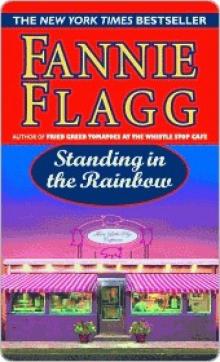 Standing in the Rainbow
Standing in the Rainbow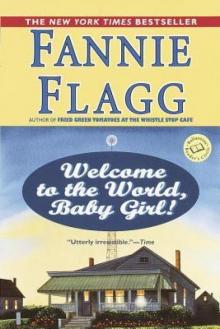 Welcome to the World, Baby Girl!
Welcome to the World, Baby Girl!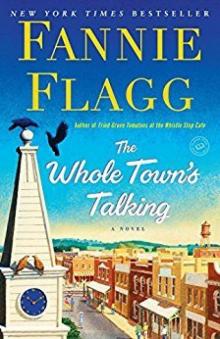 The Whole Town's Talking
The Whole Town's Talking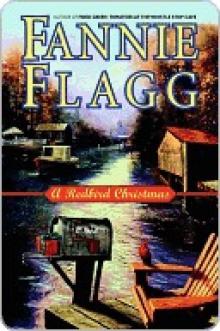 A Redbird Christmas
A Redbird Christmas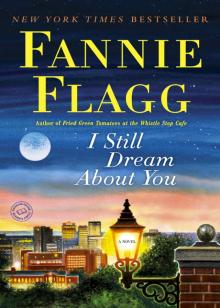 I Still Dream About You
I Still Dream About You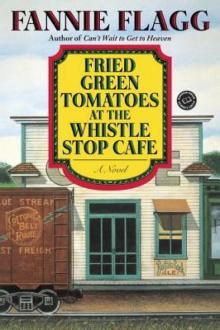 Fried Green Tomatoes at the Whistle Stop Cafe
Fried Green Tomatoes at the Whistle Stop Cafe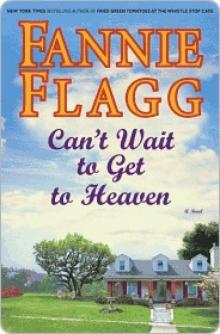 Can't Wait to Get to Heaven
Can't Wait to Get to Heaven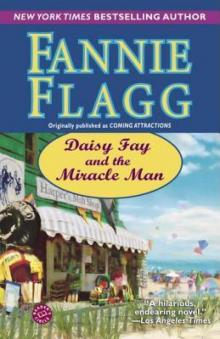 Daisy Fay and the Miracle Man
Daisy Fay and the Miracle Man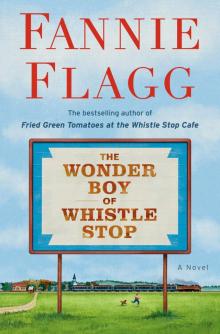 The Wonder Boy of Whistle Stop
The Wonder Boy of Whistle Stop The All-Girl Filling Station's Last Reunion
The All-Girl Filling Station's Last Reunion I Still Dream About You: A Novel
I Still Dream About You: A Novel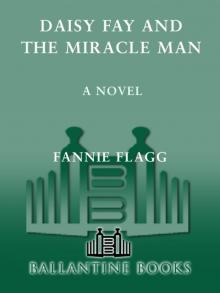 Daisy Fay and the Miracle Man: A Novel
Daisy Fay and the Miracle Man: A Novel